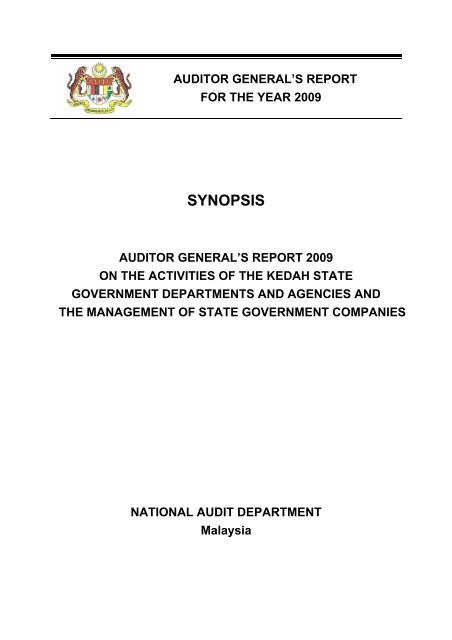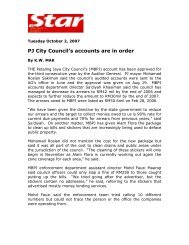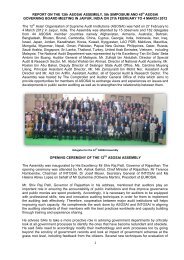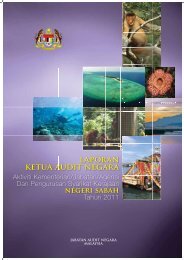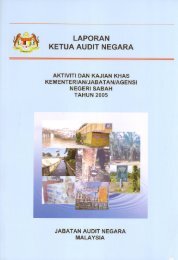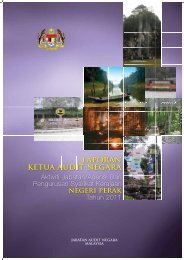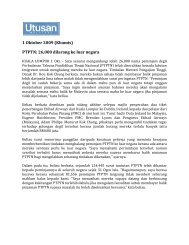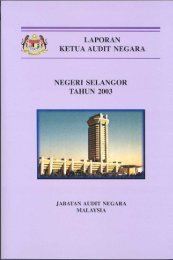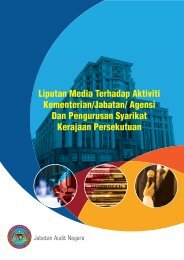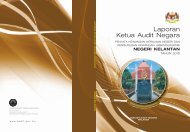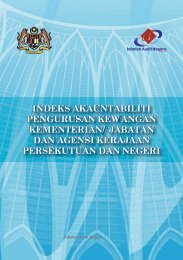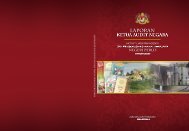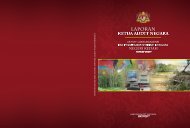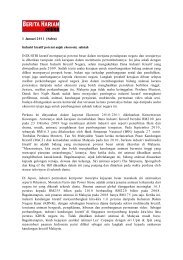SYNOPSIS
SYNOPSIS
SYNOPSIS
- No tags were found...
Create successful ePaper yourself
Turn your PDF publications into a flip-book with our unique Google optimized e-Paper software.
AUDITOR GENERAL’S REPORTFOR THE YEAR 2009<strong>SYNOPSIS</strong>AUDITOR GENERAL’S REPORT 2009ON THE ACTIVITIES OF THE KEDAH STATEGOVERNMENT DEPARTMENTS AND AGENCIES ANDTHE MANAGEMENT OF STATE GOVERNMENT COMPANIESNATIONAL AUDIT DEPARTMENTMalaysia
PREFACE1. Article 106 and 107 of the Federal Constitution and the Audit Act 1957 requires theAuditor General to audit the State Government financial statement as well as its activitiesand to submit his Report to the His Majesty, the Supreme Head of Malaysia and His RoyalHighness, the Ruler of State of Kedah. His Majesty will give his Royal assent for the Reportto be tabled in Parliament while His Royal Highness will assent for the report to be tabled inthe State Legislative Assembly. To fulfil these responsibilities, the National Audit Departmentconducts performance audit to evaluate the performance of State Government activities asto whether they were carried out efficiently, prudently and achieve the stipulated targets.2. My Report on the management of activities of the departments/agencies of theKedah State Government for the year 2009 is a result of an audit carried in thirteen statedepartments/agencies namely the State Secretary’s Office; Treasury Office; Public WorksDepartment, Agriculture Department; Veterinary Services Department; Kuala Muda LandOffice; Kuala Muda, Sik and Kulim District Land Offices; Department of Irrigation andDrainage; Department of Environment; Kedah State Economic Development Corporationand Langkawi Municipal Council Tourism City. The programmes and activities audited werethe management of departmental vehicles; the management of the maintenance on Stateroad; the management of fruit industrial development programme; the management on theprogramme to increase livestock; the management of a computerised land revenuecollection system; the management of sand mining and extraction activities and its impact onthe environment; the management on the upgrading of Jerai Hill Resort and solid wastemanagement and its impact on the environment while the state government companies areKedah Resort Sdn. Bhd.; Seri Temin Development Corporation Sdn. Bhd. And KSDCInsurance Brokers Sdn. Bhd..3. The objectives of this audit is to evaluate whether the programmes/projects wereimplemented effectively and within the stipulated time frame, the contract specifications andterms and conditions of the agreement were complied with, no wastage and achieve theirtargets. Overall, the audit revealed there were still some shortcomings as reported in myReport for the year 2008 and these weaknesses can impair the image of the government aswell as the public services.4. All Controlling Officers were informed of the matters reported to obtain theirconfirmations. This Report also includes the current status of the matters raised in my 2008Report to give an extent of the follow-up and corrective actions taken by the departments/agencies with respect to the issues raised. Generally, the departments/agencies have takencorrective actions on those weaknesses.5. Besides fulfilling the legislative requirements, I hope this Report will be a basis forremedial actions and to enhance the accountability and integrity of the
departments/agencies. This Report is also vital for addressing the economic crisis and toact as a mechanism for the public service to transform all performance and public policiessuch as to ensure conservation and sustainable management of resources, reducing thedigital gap between urban and rural areas, providing quality service to society, eradicatingpoverty, restructuring the Malaysian society, increasing the nation’s economic activities,strengthening the family institutions and to provide proper facilities. Indirectly, this willcontribute to the Government Transformation Programme with its slogan “People First,Performance Now” hereby fulfilling the needs, interests and aspirations of all Malaysians.6. I would like to express my gratitude to all officers in the various departments andagencies who have given their full cooperation to my officers during the audit. I would alsolike to extend my appreciation and thanks to my officers who have worked diligently and theircommitment to complete this Report.(TAN SRI DATO’ SETIA AMBRIN BIN BUANG)Auditor General of MalaysiaPutrajaya6 July 2010
<strong>SYNOPSIS</strong>PART I - ACTIVITIES OF THE DEPARTMENTS/AGENCIES1. State Secretary Office, Kedah; State Treasury Office, Kedah and Public WorksDepartment, Kedah - The Management of Departmental VehiclesDuring the years 2006 to 2009, the State Government approved an allocation ofRM11.59 million for the acquisition of vehicles of which RM7.83 million was spent. From anallocation of RM11.59 million, RM9.33 million was allocated to the State Secretary Office(SSO), State Treasury Office (Treasury) and Public Works Department (PWD) of whichRM6.68 million was spent. Overall, the vehicles at the three departments were notsatisfactorily managed. Several weaknesses were observed such as no maintenanceschedules, fuel was filled into the vehicles within a short timeframe, double paymentsamounting to RM30,270 and Master Record on Vehicle were not maintained by the SSO.Vehicles under warranty at the Treasury Office were serviced at unauthorized workshopswhile PWD bought diesel beyond the quoted price of the Government. In addition, no actionwas taken to dispose the damaged vehicles and also vehicles which were certified fordisposal.2. Public Works Department, Kedah (PWD) – The Management of the Maintenanceon State RoadPublic Works Department (PWD) is responsible for the planning, implementing andmonitoring on the maintenance of state roads to ensure that the roads are safe and in goodcondition. An allocation of RM223 million for the maintenance of 4,528 kilometer state roadsunder the Ninth Malaysia Plan were approved by the State Government. For the years 2007to 2009, the department spent RM136.61 million from an allocation of RM141 million for themaintenance of roads throughout the state. An audit was carried out between December2009 to February 2010 at PWD of Muda/Sik District and PWD Pendang/Yan District. Overall,the state roads were not satisfactory maintained. There were some weaknesses such asprojects were approved but not implemented instead substituted for urgent projects,procurement of signboards not in accordance to specifications, wrong coding of expenditure,delays in maintenance works, variation orders were not approved by an authorised officerand diesel was purchase not in accordance to the Government approved market price.3. State Agriculture Department, Kedah – The Management of Fruit IndustrialDevelopment ProgrammeThe Fruit Industry Development Programme, implemented by Kedah AgricultureDepartment, is to ensure that the fruits produced are of high quality and sufficient to meet
the local demand as well as the fruit processing industry. During 2007 to 2009, the StateGovernment allocated RM14.40 million for the implementation of this programme, of whichRM11.34 million was spent. An audit carried out in October 2009 to January 2010 showedthat the programme was satisfactorily implemented as it helped to increase the production offruits and the income of farmers in the State. However, there were some weaknesses in themanagement of the programme such as on the selection of participants and the projectareas; agreement with participants not drawn up, projects not implemented according to bestagricultural practices; project delays in implementation and excessive stock of fertilizer in thestore of the Agriculture Department.4. Veterinary Services Department, Kedah – The Management On The Programmeto Increase LivestockThe Kedah Veterinary Services Department (Department) is responsible fordeveloping the livestock industry in the State. The Department introduced the LivestockDevelopment Plan which comprises six programmes including the Programme to IncreaseLivestock (Programme). Through the TRUST Scheme as one of the ways to implement theProgramme, ruminant animals such as buffalo, cattle, goats and sheep were distributed tothe participants. Participants were required to surrender to the Department the first femaleoffspring which meets the stipulated conditions while the parent and other offsprings belongto the farmers. By surrendering the first female offspring at the prevailing market price, theparticipant is deemed to have repay his dues to the Department. The objective of thisProgramme is to increase the source of income of the farmers by increasing the livestock,meat production from local livestock and modernising the animal husbandry with the GoodAnimal Husbandry Practice (GAHP). Overall, the implementation of this Programme is notsatisfactory due to weaknesses in the management of the TRUST Scheme, participants,livestock, records, information and monitoring. The Department should take a seriousapproach to achieve the objectives set out in the TRUST Scheme.5. Kuala Muda Land Office – The Management On The Computerised LandRevenue Collection SystemThe collection of land revenue by Kuala Muda Land Office for the years 2007 to 2009amounted to RM109.32 million. This revenue consists of recurring quit rent, quit rent for thefirst year, arrears of quit, land premiums, licences and permits. In 2007 the Government ofKedah replaced the Computerized Land Revenue Collection System (SPHT) with the OnlineLand Revenue Collection Management System (SUKHAT). The State Governmentappointed a company to implement Online SUKHAT at a cost of RM2.16 million for theperiod 2007 to 2010. The objective of SUKHAT is to reconstruct and replace exitingapplication towards facilitating customers and to enhance the state revenue collection aswell as to reduce the arrears. Overall, the management of land revenue collection throughthe use of Online SUKHAT has assisted the administration on land matters and also reducedstaff workload. However, there were weaknesses in the integrity of data such as the validity
and accuracy of data, incomplete information on land owners, records on quit rent were notupdated, delays in sending reminders to land owners with tax arrears and also delays inprocessing 6A Notice.6. Kuala Muda, Sik and Kulim District Land Offices, The Department of Irrigationand Drainage - The Management of Sand Mining and Extraction Activities And ItsImpact To The EnvironmentThe Office of Land and Mines (PTG), Kedah is responsible for managing andprotecting the land resources of Kedah. Among the major land resources in the State is rockmaterials consisting of sand, rock and laterite soil. Sand is one of the main components inthe construction industry and road building. Two categories of sand that can be used forconstruction are land and river sand. The most readily and abundance of sand supply is fromthe river beds and its surrounding banks. In Kedah, pumps, pontoons and dredges are beingused in the sand extraction activities. Overall, the management of sand mining andextraction is not satisfactory as the operators breached the conditions stipulated by theDistrict Land Office (PTD). The sand extraction activities which were not properly managedaffected the environment such as water turbidity, the collapse of the river banks, air qualitydeterioration and damages to the road. The enforcement and monitoring of sand extractionactivities was not satisfactory as the monitoring plan on the sand quarry operators was notimplemented, there is no special unit to carry out enforcement activities and the lack ofcoordination between PTG, PTD, the Public Works Department, the Drainage and IrrigationDepartment and the Department of the Environment.7. The Kedah State Economic Development Corporation - The Management On TheUpgrading of Jerai Hill ResortThe Jerai Hill Resort was built in 1985. It is located near Mt. Jerai which is 1,217meters above sea level and is the highest peak in Kedah. The purpose of upgrading theresort is to make this resort as one of the tourist destinations in Kedah. The project involvedbuilding extra new chalets and upgrading existing buildings consisting the main building, VIProoms, multipurpose hall and staff quarters. Kedah Sato Sdn. Bhd. was appointed by KedahState Development Corporation (KSDC) to carry out the upgrading project, while theRegency International Hotel was appointed to operate the resort. Overall, the managementon the upgrading project is satisfactory. However, Audit observations revealed severalweaknesses that need immediate actions in order to enhance the quality of the project andto ensure customers’ safety and satisfaction. Among the weaknesses were delay incompletion within the stipulated contract period, delay in applying for the Certificate Of DelayAnd Extension Of Time (E.O.T), operating the resort without the Certificate Of CompletionAnd Compliance (C.C.C), unsatisfactory management of the project Variation Orders (V.O),works without planning and building plan approvals, poor work supervision and the supply of
low quality furniture, no agreement on the management of the resort, appointment ofsubsidiary as the project contractor and the resort was operating without the fire assurancecoverage.8. Langkawi Municipal Council Tourism City - Solid Waste Management And ItsImpact To The EnvironmentLangkawi Municipal Council Tourism City (Council) was established on 4 December2001. It has an area of 47,848 hectares which cover the whole island of Langkawi. Theaverage weight of the solid waste is 80 tons per day and can increase to 120 tons on publicand school holidays. Overall, the implementation of solid waste management is notsatisfactory. Weaknesses that need to be addressed is the management of solid wastedisposal sites, leachate water treatment plant which was upgraded at a cost of RM2.58million was not functioning and does not comply with the standards set by the Department ofEnvironment, landfill not in compliance with the specified guidelines, washing bay facility notprovided and delay in banking tipping fees. The implementation of waste collection andcleaning should be given due attention as leachate flowed onto the road during the collectionof waste and garbage were not properly cleared.PART II – MANAGEMENT OF STATE GOVERNMENT COMPANIES9. Kedah Resort Sdn. Bhd.Kedah Resort Sdn. Bhd. (KRSB), which was established on 9 February, 1982 underthe Companies Act 1965, is wholly owned by Kedah State Development Corporation (PKNK)with a paid-up capital of RM6.20 million. The purpose of establishing KRSB is to providehotel services so as to generate revenue for PKNK. Overall, the financial performance ofKRSB for 2006 to 2009 was not satisfactory. Besides, the high loan liability, KRSB onlyrecorded a net profit of RM0.07 million in 2006 while suffered losses in 2007 to 2009amounting to RM0.33 million, RM0.96 million and RM0.28 million respectively. The losseswere due to shutdown in operations for construction and also the delay in completing theproject on schedule. PKNK did not manage SP Inn hotel business well as KRSB failed tocomply with the regulations prescribed in the management of the upgrading hotel facilities,variation orders, poorly managed, accelerating construction cost and security problem in thehotel building as well as inefficiency of financial management. KRSB has not contributed anydividends to PKNK as it is faced with low cash flow.10. Seri Temin Development Corporation Sdn. Bhd.Seri Temin Development Corporation Sdn. Bhd. (STDC) was established under theCompanies Act 1965 on 15 March 1979 with an authorized capital of RM5 million and apaid-up capital of RM2 million. STDC is a wholly owned subsidiary of the Kedah StateDevelopment Corporation (PKNK) with the objective to generate financial resources to


